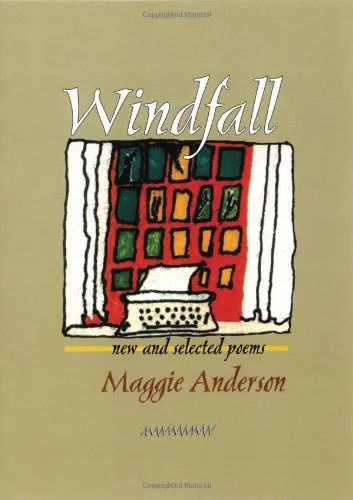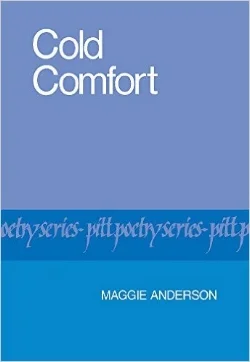Windfall: New and Selected Poems
“Anderson's poems have a gentle feel but contain a deep intensity; they move slowly, quietly, and need to be absorbed over time. . . . There is an exploration here of the heart that is rare, desperately needed in today’s world, and universal to us all.” --Lambda Book Report
"Maggie Anderson has been a poet of energy and wisdom, of conscience andcourage, since her earliest work. In this new collection I am particularlyimpressed by the cropped force of poems like Knife, The Sleep Writer, and the Black Dogpoems, which chillingly convey private and public worlds of terrorand control. Caught between the oppositions of decorum and lawlessness, indolence and rigor, spiced by secrecy and appetite, Anderson is a poet whoconfronts loss and dread and, like the black dog, despite the grey fog, stands up.” --Alicia Suskin Ostriker
A Space Filled with Moving
Anderson writes in the poem "Setting Out" that "even the most beautiful / of late summer days can cramp into a memory, uneasy /attention to what we haven't thought about in years." In attempting to transform her life experience into poetry, the poet is unfortunately unable to conjure up more than a "cramp" of emotion when relating the events of her past. She writes in "Empirical" that "Everything sad that ever happened to me / I have mourned beside a river"--an interesting declaration, to be sure; but what follows is 'string' is singular a string of vague metaphors and incongruous images. Anderson speaks much about the places where she has visited and lived, and often gets caught up in descriptive details at the expense of any emotional and spiritual resonance that an account of her activities could produce. Ultimately, the poet is quite up front about her reluctance to share anything other than occasionally clever wordplay with readers. She notes in "Heart Labor": "You want me to name the specific sorrows? / They do not matter. You have your own." —Publishers Weekly
Cold Comfort
“She is primarily a poet of moral urgency—a political poet as we say these days—but she is never shrill, relying on the tensions inherent in the natural world rather than rhetoric.” —American Book Review
“I like Maggie Anderson’s strong sense of place and the unsentimental attention she pays to her West Virginia origins. These are rooted poems. Even the vegetables’ dreams rely on a vivid internal logic. As ‘corn . . . the enormous yellow dirigible of August . . . dreams fair weather’ and ‘dill . . . drifts seeds onto cucumbers it schemes to marry,’ I am beguiled.” —Maxine Kumin
“The beautiful and scruffy where Maggie Anderson grew up should thank her for her fidelity to it, for she’s made from that devotion a model of love useful there or anywhere. She’s intellectually alert to the lures of comforts and wisdom and emotionally honest enough to want them all the same; she ‘holds to her task / in the face of speculation,’ as she writes of a grandmother photographed with her arms full of wash. She’s funny (‘Only responsible people keep cows’) and deadly serious. She’s one of the ways our poetry has chosen to remind us who we are, and how much choice we had in that, and how little.” —William Matthews
Years That Answer
Exploring the interior life, Anderson's poems, frequently triggered by a particular recollection, cover the spectrum of human emotion and experience--death, loss, terror, intimacy, longing, contentment, love, understanding



